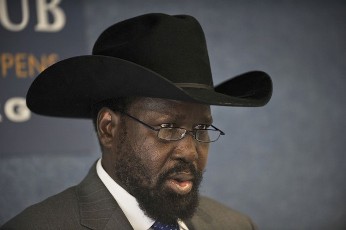South Sudan president accuses Khartoum of stealing its oil
January 2, 2012 (KHARTOUM) – The president of South Sudan Salva Kiir accused the Sudanese government of stealing his country’s oil in a new sign of escalation between the two ex-foes.

Kiir described this as ‘looting in a broad day light’ in his message which was published on the website of the South Sudanese government.
A source close to South Sudanese government told the Sudan Tribune that Khartoum had stolen 1.2 million barrels of oil from the pipelines and diverted it to the refineries in al-Obeid, North Kordofan and al-Gailey, north Khartoum. South Sudan may soon take the decision to stop pumping oil, the source added.
The two neighboring nations are set to enter a new round of negotiations regarding oil this month. It is hoped that the new round of talks will bring both sides closer to a settlement of the long-standing dispute relating to the fees paid by landlocked South Sudan for the use of pipelines owned by Sudan. The pipelines are used to transport oil to export terminals in the coastal city of Port Sudan.
The African Union High-Level Implementation Panel (AUHIP) chaired by former South African president Thabo Mbeki had previously tabled proposals which were rejected by both sides.
The AUHIP’s previous proposal outlined a compromise which would require South Sudan to pay Khartoum an annual percentage of its oil exports. However this proposal failed when Sudan rejected the South Sudan’s offer of US$5.4 billion per year, and instead demanded US$7.4 billion.
Sudan is desperate for an accord to be sealed with its southern neighbor because it is undergoing a severe economic crisis after losing 75% of its oil reserves when South Sudan succeeded in July 2011.
Kiir said that his country had “made substantial offers that would improve the economic and financial gaps of the Republic of Sudan in the spirit of Comprehensive Peace Agreement and to ensure mutual viability of the two states as a good gesture”.
He warned Khartoum that its ‘hostile attitude’ should stop, adding that Juba will continue with diplomatic avenues to address the outstanding issues between the two nations.
The two countries have recently exchanged accusations regarding support for rebels who are fighting the respective governments. Sudan has lodged three complaints with the United Nations Security Council (UNSC) against South Sudan in this regard.
China, which has the largest stake in South Sudan’s oil, urged both countries to settle their disagreements through negotiations, while cautioning Khartoum against disrupting the flow of oil as it has threatened before.
Sudan has also warned that it will take a portion of the oil pumped by the South Sudan as a form of payment if negotiations fail.
(ST)
